Nato warns of Russian army build-up on Ukraine border
- Published
Nato's General Philip Breedlove warned that the Russian force at the Ukrainian border now to the east is ''very, very sizeable'', as Rajesh Mirchandani reports
Nato's military commander in Europe has issued a warning about the build-up of Russian forces on Ukraine's border.
Supreme Allied Commander Europe Gen Philip Breedlove said Nato was in particular concerned about the threat to Moldova's Trans-Dniester region.
Russia said its forces east of Ukraine complied with international agreements.
The build-up has been linked to Russia's annexation of Crimea from Ukraine, following the removal of Ukraine's pro-Moscow president.
Ukrainian Foreign Minister Andriy Deshchytsia warned that the risk of war with Russia was growing.
"The problem with [Russian President Vladimir] Putin is that he doesn't want to talk to - not only to the Ukrainian government - but also to the Western leaders," Mr Deshchytsia told the BBC.
The Russian Ambassador to the EU, Vladimir Chizhov, has said that Russia does not have any "expansionist views."
"And this is quite a danger for the decision-making process. We could only expect that he might invade."
Meanwhile, several parts of Crimea have been hit by power cuts blamed on technical problems in a transmission line from the Ukrainian mainland to the Black Sea peninsula.
Crimea's power provider Krymenergo said in a statement on its website that it was forced to implement partial power cuts after a line run by Ukraine's national electricity company, Ukrenergo, was hit by a technical fault and needed to be repaired.
Most of Crimea's electricity, as well as its water and food, comes from the Ukrainian mainland.
'Illegal'
In Washington US security official Tony Blinken told CNN that America was reviewing every request Ukraine was making for help.
But cautioned that even if assistance was forthcoming, it would be "very unlikely to change Russia's calculus or prevent any invasion".
President Barack Obama earlier ruled out sending US troops to Ukraine.
Moscow formally annexed Crimea after the predominantly ethnic Russian region held a referendum which backed joining Russia.
Kiev and the West condemned the vote as "illegal".
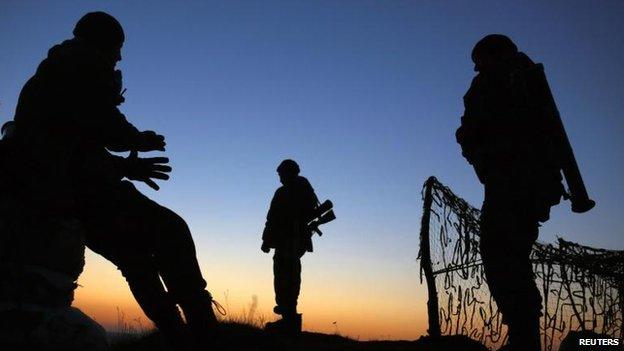
Ukrainian troops are stationed on the border with Russia, in smaller numbers
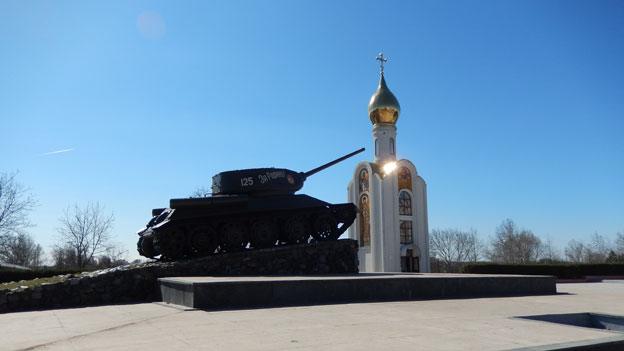
A war memorial in Tiraspol, Trans-Dniester. Nato fears Russian troops could move there quickly
Russian flags have now been hoisted at 189 Ukrainian military units and facilities in Crimea, the Interfax news agency reports.
Moscow's EU envoy told the BBC the "reunification" had not been planned, but was the end of an "abnormality" which had lasted for 60 years.
Vladimir Chizhov also said Moscow did not have any "expansionist views" and that "nobody should fear Russia".
However, Ukrainian security chief Andriy Parubiy told a rally in Kiev: "The aim of Putin is not Crimea, but all of Ukraine. His troops massed at the border are ready to attack at any moment."
'Adversary'
The comments by Gen Breedlove came at an event held by the German Marshall Fund think-tank in Brussels.
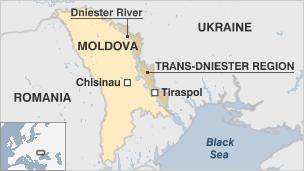
He described the Russian forces at the Ukrainian border as "very, very sizeable and very, very ready".
"There is absolutely sufficient force postured on the eastern border of Ukraine to run to Trans-Dniester if the decision was made to do that, and that is very worrisome," he said.
"Russia is acting much more like an adversary than a partner."
Trans-Dniester is a narrow strip of land between the Dniester river and Ukraine's south-western border and it proclaimed independence from Moldova in 1990.
The international community has not recognised its self-declared statehood.
As Crimea was annexed, the Trans-Dniester Supreme Soviet sent a request asking to join the Russian Federation.
Bases stormed
Correspondents say Russian forces appear to be stepping up their efforts to secure full military control of Crimea.
The BBC's Ian Pannell, in Belbek, says the few remaining Ukrainian troops on the peninsula feel beleaguered and abandoned by their commanders.
He saw Russian troops use stun grenades and automatic weapons in a raid on the Belbek airbase, near Sevastopol, on Saturday.
Another BBC correspondent witnessed the takeover of the Novofedorivka naval base in western Crimea by Russian troops.
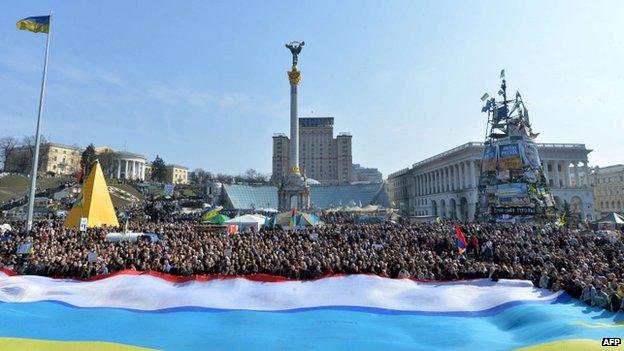
A big unity rally is being staged in Ukraine's capital Kiev
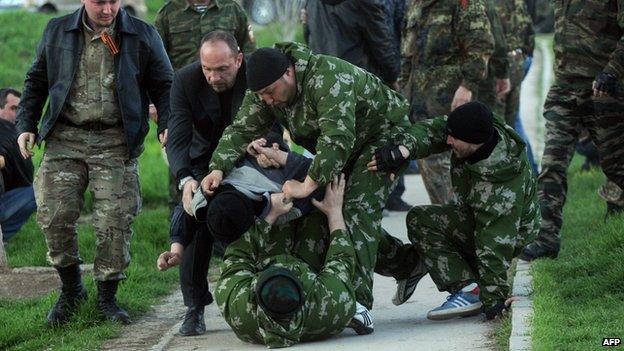
Pro-Russian men beat an unknown man during the takeover of the Belbek airbase on Saturday
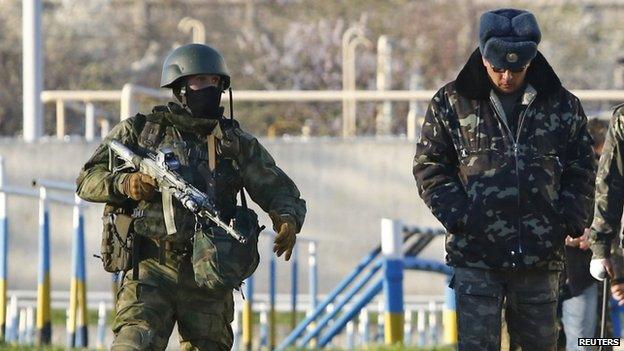
Ukrainian soldiers in Belbek were given an ultimatum to leave the base on Saturday.
Russian soldiers and pro-Russian protesters stormed the base and forced Ukrainian troops to leave.
Russia annexed Crimea following a referendum on 16 March, which came after the overthrow of Ukrainian President Viktor Yanukovych in February.
The Kremlin said it had acted to protect its "compatriots" in Crimea from "fascists" moving in from the mainland Ukraine.
The US and EU responded with a series of sanctions targeting individuals they say played roles in Crimea's annexation.
